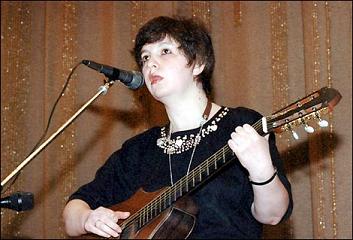In 1971 a young girl began writing her own songs. She was 15 years old. Her guitar was young and so were her poems. Three years later, her friends knew her as an 18-year-old poetess with a guitar, a miniature “bard”. On the way to a birthday party, she got off at a Moscow metro to write a song and give it as a present for her friend. She did not know that 25 years later she would be singing that song to thousands of people.
Veronika Dolina was born in Moscow in on January 2 1956. Not much is known about her biography, except that she finished the university in Moscow in 1978, and taught French. She appeared on the stage in the early seventies and was immediately hailed as one of the first members of the post-okudzhava bard movement. Her voice was young and feminine; her poetry was individual and fresh. Her guitar accompaniment was nothing special, it followed the style of Okudzhava, but there was something different in her style.
 |